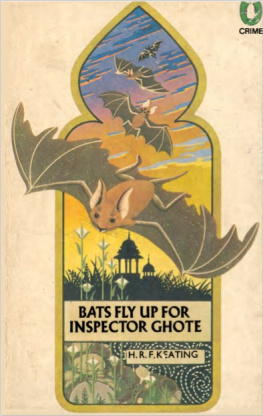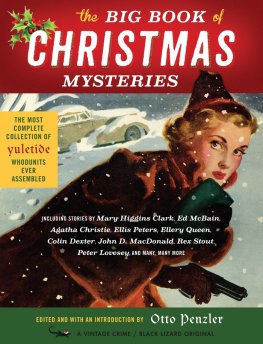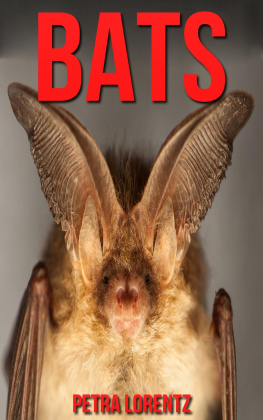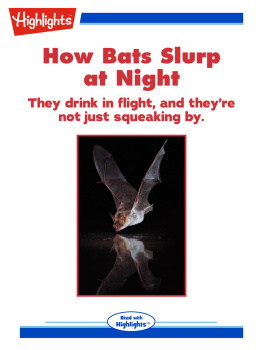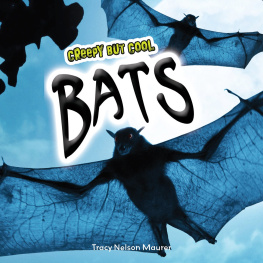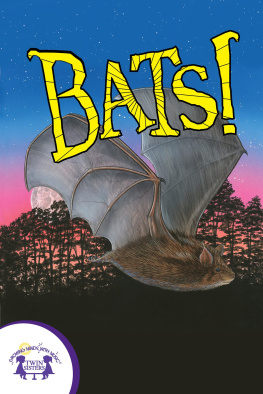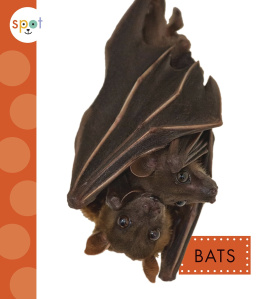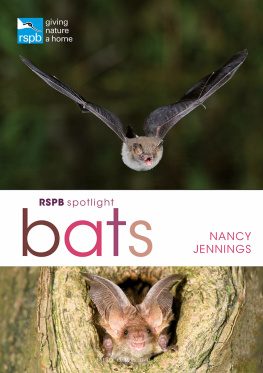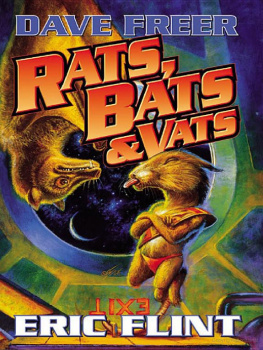Keating - Bats Fly up for Inspector Ghote
Here you can read online Keating - Bats Fly up for Inspector Ghote full text of the book (entire story) in english for free. Download pdf and epub, get meaning, cover and reviews about this ebook. year: 1974, publisher: penguin, genre: Detective and thriller. Description of the work, (preface) as well as reviews are available. Best literature library LitArk.com created for fans of good reading and offers a wide selection of genres:
Romance novel
Science fiction
Adventure
Detective
Science
History
Home and family
Prose
Art
Politics
Computer
Non-fiction
Religion
Business
Children
Humor
Choose a favorite category and find really read worthwhile books. Enjoy immersion in the world of imagination, feel the emotions of the characters or learn something new for yourself, make an fascinating discovery.
- Book:Bats Fly up for Inspector Ghote
- Author:
- Publisher:penguin
- Genre:
- Year:1974
- Rating:3 / 5
- Favourites:Add to favourites
- Your mark:
- 60
- 1
- 2
- 3
- 4
- 5
Bats Fly up for Inspector Ghote: summary, description and annotation
We offer to read an annotation, description, summary or preface (depends on what the author of the book "Bats Fly up for Inspector Ghote" wrote himself). If you haven't found the necessary information about the book — write in the comments, we will try to find it.
Bats Fly up for Inspector Ghote — read online for free the complete book (whole text) full work
Below is the text of the book, divided by pages. System saving the place of the last page read, allows you to conveniently read the book "Bats Fly up for Inspector Ghote" online for free, without having to search again every time where you left off. Put a bookmark, and you can go to the page where you finished reading at any time.
Font size:
Interval:
Bookmark:
H. R. F. Keating
Bats Fly Up for Inspector Ghote
Copyright H. R. F. Keating, 1974 All rights reserved
H. R. F. Keating was born at St Leonards-on-Sea, Sussex,
in 1926 and went to school at Merchant Taylors. After a period of what he describes as totally undistinguished service in the army, which he joined the day the war ended, he went to Trinity College, Dublin, where he became a Scholar in modern literature. From Dublin he went to Wiltshire as a journalist and, before he began devoting his time to writing, he had worked in Fleet Street on the Daily Telegraph and The Times.
His first crime novel, Death and the Visiting Firemen came out in 1959 and The Perfect Murder won the Crime Writers Association Golden Dagger for 1964. He was Chairman of the Crime Writers Association 1970 to 1971, is crime fiction reviewer for The Times and has published a study of detective stories of the 1930s, Murder Must Appetize. Other books by H. R. F. Keating published in The author is married to Sheila Mitchell, the actress, and has three sons and a daughter.
Till the bats began to fly. Inspector Ghote set that time as a limit. Within a few minutes of the creatures coming, swooping and darting over the heads of the crowds beginning now to saunter up from Chowpatty Beach, darkness would be on them all, like a lid swiftly placed down. And then there would be no hope at all of spotting a pickpockets team.
Then there would be no chance, as a gang made its way purposefully along against the stream of festival-happy, homeward-bound Bombayites, of ambushing one of them just at the moment of his crime. Then there would be no more chances of notching up just one more arrest towards the secret total which Ghote suspected uneasily Deputy Superintendent Samant had set for him. And the cloud of faint disgrace which he felt hung round him always nowadays would become one shade darker. He could not afford to let that happen.
When the bats left their daytime hanging-places, perhaps in the trees round Blavatsky Lodge just back from the sweep of Marine Drive, perhaps in the gardens beside the much-domed Babulnath Temple, it would be too late. Ghote scanned the crowd, with which he was slowly moving onwards, almost feverishly.
The people strolling alongside him were nearly shoulder-to- shoulder thick as far ahead as he could see. Thousands and thousands had come down to Chowpattys broad semicircle of sand to watch the final ceremonies of the Ganpati Festival on its twelfth and last day. The earlier events had not attracted so much attention, but the final ceremony was, as always, the occasion for immense excitement.
As many as a hundred thousand people had been expected to line the routes of the processions taking the huge decorated statues of elephant-headed Lord Ganesha, mounted on slowly chugging trucks, down to the shores of the city to be immersed in the sea. Balconies all along the routes had been packed to danger point. Pavements had been jammed to stifling closeness.
The branches of the trees bad been loaded with ambitious urchins, shouting and bright-eyed. And then, when the holy idols and the floats with scenes from the Ramayana and the Mahabharnta and the marchers from the poorer quarters with their home-made music and their gymnastic displays had gone by, all the watchers, elated by their darshan of pot-bellied, luck-bringing Lord Oanesba, bad come pouring down to the beaches.
And there the gorgeous statues, gold and silver and mirror-brilHnnt embroidery outside, clay or plaster within, had gone lurching inch by inch into the consuming sea.
It had all meant more work for the police department, leave forbidden, extra hours meted out.
But thanks to them the whole business had been orderly and peaceful. The lost children had been taken to the specially set-up collection points and had eventually been restored to distraught parents. The people who had fainted had been carried to the first-aid stations. Potential rioters had seen the signs and had behaved themselves. And, if pockets had been picked in these ideal conditions, arrests had equally been made.
It had been police work at its best. Ghote felt a solid contentment at the thought of it all. Except that by no means enough of the pickpocketing arrests had been made by him. He needed more. Ideally several more. One more at least definitely, before darkness fell.
Well, the circumstances could not be better for him. A pickpocketing gang would stand out here clearly as clearly, despite all the thousands of people. To a mind tuned to see the pattern of men or boys, each on his own, making their way against the stream of a crowd, nothing could be clearer. It would be unmistakable to the properly suspicious eye. There would be the leader, the one who made the actual thefts, with close behind him the hand-over wallah, to receive the stolen purses or wallets within moments of the lifting. And then in a looser chain behind there would be another two or three gang members to pass the booty swiftly along till in one rapid inconspicuous movement it would be safe to gut the contents, throw away the incriminating container and pass back the money. And somewhere to the side - it would have been on the opposite pavement if the road were narrower than the broad sweep here - there would be the lookouts, eyes darting to and fro, terribly obvious to the trained mind in his contrast to the easy-going holiday-makers all round.
A lookout would show up, no doubt, as much as he himself would show up to them, pricklingly alert as they must be, if he were not constantly making sure his every glance was under control. Or as much as Acting Detective-Constable DCruz, his Anglo-Indian partner in this weary chore, must show up. And, following at a regulation twenty-five yards distance, he would be jutting up like a great, bandaged, sore thumb.
DCruz was a trial. And, Ghote suspected at times, a trial deliberately thrust upon him by Deputy Superintendent Samant himself. It was necessary to have two officers in tandem on anti-pickpocketing duties, since seldom does the victim know that a theft has taken place at all and thus can never be relied on as a witness, but as a second man DCruz was useless.
It was not that he did not see things. On the contrary, he saw too much. Anything and everything was liable to distract him. A-pretty girl student, long plait of hair swinging, or a particularly ugly old woman, face hair-sprouting and gap-toothed, lined with wrinkles close as they could cram, either was likely to catch his eye and hold him gawping. A one-eyed man, an ash-smeared sadhu, a tall-turbaned Rajput, any such moderately common sight might halt him in his tracks and put him into a daze of unthinking wonder.
Plain then to see how, with such a number two, his tally of arrests had been so low in all the months that he had day after day been allocated to this most chore-like of detective duties. And how could he not help suspecting that DCruz was part of some scheme of the DSPs. Was it not being made almost impossible for him to show good results so that he could be eased out of the CID without having grounds for complaint?
But surely that was ridiculous? Surely he must be seeing plots where none existed? After all, someone had to be put on anti-pickpocketing patrol. And someone, even, since DCruz had been admitted on probation to the CID, had to show the chap the ropes.
But he must not let thoughts like these blossom in his head. They obscured concentration.
All too easily it was possible to let the mind wander. And then all that met the eye was people, people of all sorts, milling happily along, men, women and children. Then boys on their own looked simply like sportive youngsters dashing away from family groups. Then you stopped seeing that some of them were hardened little trained criminals. Then you forgot that homeless urchins were recruited by the bosses of the pickpocketing gangs. You forgot there were boys who, in return for being housed and fed and with the fear of punishment and of deprivation goading them sharply on, went out to rob just as hard as they could by day and by night.
Next pageFont size:
Interval:
Bookmark:
Similar books «Bats Fly up for Inspector Ghote»
Look at similar books to Bats Fly up for Inspector Ghote. We have selected literature similar in name and meaning in the hope of providing readers with more options to find new, interesting, not yet read works.
Discussion, reviews of the book Bats Fly up for Inspector Ghote and just readers' own opinions. Leave your comments, write what you think about the work, its meaning or the main characters. Specify what exactly you liked and what you didn't like, and why you think so.

